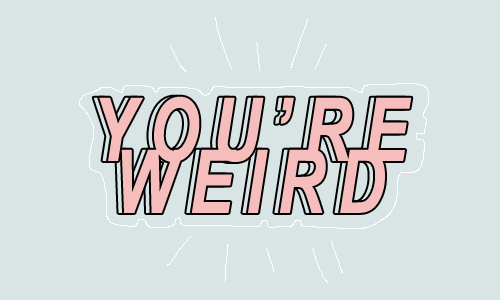Yeah, that definition doesn't actually exist. And in all honesty, it probably won't ever exist. Our definition of what is normal and acceptable changes constantly, and is under heavy influence from factors, such as time period, culture, and even individuals. In the words of my Clinical Psychology textbook:
"It can be the case that what is determined as abnormal or pathological at one point in time could have been very adaptive at another time."
So, the big ticket question is this: how can psychology experts scientifically prove a behavior to be acceptable (normal) or a mental illness (abnormal)? Since our understanding of a concept like normality vs. abnormality isn't science based - it is relative and related more to sociology and culture - it is incredibly difficult to prove this. Not that this has stopped us from trying (and failing), but let's take a look into all the things shaping our sense of "normal."
INDIVIDUAL SENSE OF NORMAL
Let's start small, by which I mean let's talk about what is normal for a single lovely soul. As you likely know, people are complicated and unique, and we all have different ways of doing things. The way one person shows they are happy may be completely different than how another person expresses the same feeling. The same goes for if a person is feeling negative emotions, like sadness, anxiety, fear, or exhaustion. One video that I feel perfectly explains this idea is this short clip from the show "New Girl," where one of the characters is expressing their emotions in an "abnormal" way:
As you can tell, there isn't always a clear "normal" way to do things. And let's be perfectly honest with ourselves: people are WEIRD. Which is why it's so hard for us to determine if a person is behaving abnormally (i.e. dealing with a mental illness or disorder) or not.
EVOLUTION OF VALUES
For those who may be unfamiliar with the Diagnostic and Statistical Manual of Mental Disorders (DSM), it is basically the go-to manual for diagnosing and categorizing all kinds of mental illnesses. Naturally, it would be one of the first places we look to define "normal" and "abnormal" in the field of psychology. And yet, even the DSM is constantly changing and evolving with changing norms.
Perhaps the most prominent and horrendous example is in the second edition of the DSM (1973) where "homosexuality" was listed as a psychological disorder. Thankfully, as our society progressed in our understanding of gender being a construct and homosexuality being perfectly natural, the listing of it as a disorder was dropped from the DSM. One version claimed it to be a serious psychological problem (with a long list of horrific treatments to match), and then the next version comes out and suddenly it's not a problem... I mean, love is love and it should have never been in the DSM in the first place, but why would it suddenly be okay to be gay in the new edition?
This sudden shift in the list is an example of how our society's values can influence what is defined as "abnormal," and it proves that these definitions are by no means permanent. The same could be said regarding the evolution of gender norms in our society. In the past, women would have been sent to the looney bin for dressing in pants or embracing our sexuality, and the stereotypes embedded within the mental disorder known as "hysteria." And yes, this illness followed the same path of making it into the DSM only to be excluded as society's views on women changed.
EXISTENTIAL CRISIS TIME
(That sub-heading was a joke, please don't have an existential crisis over the theory of normality.)
Anyways, we as a field are still working to grasp at what behaviors to consider "normal" and what ones are "abnormal" enough to require treatment. But there are so many factors to consider (individual habits, society values, culture), and things like the DSM may not always have the most valid answer to your questions because those definitions are always changing, too. No matter how hard we, may never be able to have a concrete idea of normality that applies perfectly to everyone. This is just something we will have to accept.
RESOURCES
Linden, W., & Hewitt, P. L. (2018). Clinical Psychology: A Modern Health Profession. New York, NY: Routledge.


Comments
Post a Comment